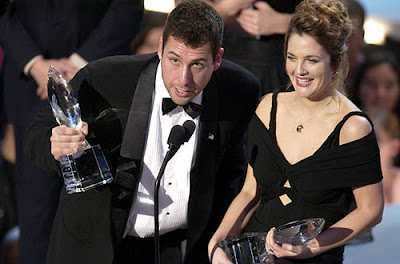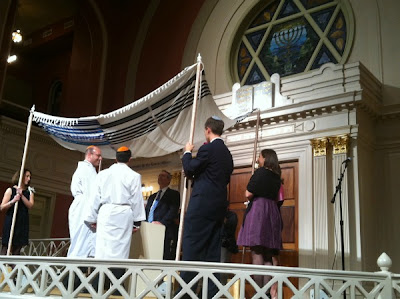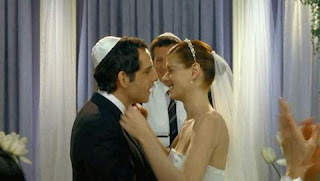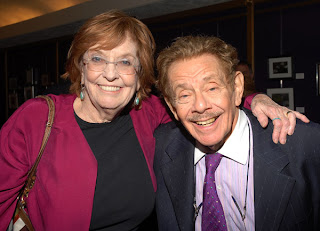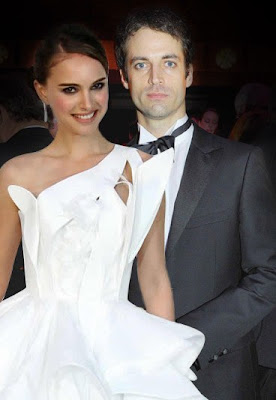These wedsites can be connected with the bride and groom’s Facebook profile and the photos guests take at the wedding can easily be shared to Pinterest and photo sharing sites like Snapfish, Polaroid Fotobar, and Shutterfly. The wedsites include such features as the gift registry, stories about how the couple met and where they became engaged, as well as where they’re headed for the honeymoon. For out-of-town guests these sites have proven to be important resources. Links to the hotel, discounts on airline flights, and the ability to coordinate travel with other guests are essential for a wedsite.
Category: Weddings
Blessing my children is something I do every Friday night before we begin our family Sabbath dinner. Last week, I had the opportunity – actually the honor – to bless my children’s Savvy Auntie. Officiating at the wedding of my sister-in-law Stephanie made me realize just how meaningful she is in the lives of my children. More important than being my wife’s sister or my sister-in-law is her role as “Auntie Steffi.”
The focus of any wedding is on the bride and groom (or on the two brides or the two grooms for that matter). But my children were made to feel so important and special during their aunt’s entire wedding weekend. She was constantly giving them little tasks to perform, having them believe that the success of the wedding depended on their help.
 |
| Photo: Nutdanai Apikhomboonwaroot |
For months leading up to the wedding, all my children talked about was Auntie Steffi’s wedding. They anticipated her big day as much as she did. Part of the excitement for them was venturing to a beautiful, tropical destination where they would play with their favorite aunt on the beach and in the pool before watching her get married and celebrating well past their bedtimes. They haven’t stopped talking about Auntie Steffi’s wedding weekend since returning home.
My children’s aunt is always showering them with gifts. As a librarian, she makes it a point to send books every few months that are carefully selected based on the interests of each child. The first thing she did when we arrived at the hotel at the beginning of her wedding weekend was present her nephews with embroidered groomsmen shirts and an adorable pink flower girl shirt for her niece.
When my daughter was a toddler, Auntie Steffi had her convinced that she was a princess. At school, she would tell her friends about her aunt who was a “real live princess.” Seeing Stephanie walk down the aisle in her beautiful wedding dress, perfectly applied makeup and fashionable hairstyle even had me convinced she was royalty on this special day.
As the rabbi standing under the chuppah (wedding canopy) with my children’s aunt and her groom, I had the pleasure of helping them sanctify their marriage. I offered my blessings that their now intertwined lives would be full of love and security, romance and peace. I have the good fortune to bless many happy couples during their wedding ceremony. The difference was that at this wedding I also blessed my children’s Savvy Auntie and gave thanks for everything she does for my children.
First, the Facebook Founder and CEO took his bride to a *kosher restaurant in the Jewish area in Rome. The couple dined at Nonna Betta where they spent 32 euros on lunch. There’s no word on why Zuckerberg decided to visit the Jewish section of Rome or why he and Priscilla chose a kosher restaurant for lunch.
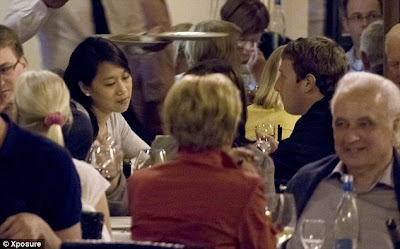 |
| Mark Zuckerberg and his wife Priscilla Chan at a kosher restaurant in Rome. |
At Nonna Betta, Zuckerberg and Chan ate traditional Roman Jewish delicacies including deep-fried artichokes, fried pumpkin flowers and ravioli stuffed with sea bass and artichokes. To drink they each had a glass of water and shared a pot of hot tea.
In addition to Zuck’s decision to eat kosher (“When in Rome!”) the second notable aspect of the couple’s Roman visit was the young billionaire’s failure to tip at the restaurant. Waiters at Nonna Betta reported that Zuckerberg acknowledged he was Mark Zuckerberg and then neglected to leave a gratuity. That’s an odd omission from someone who’s portfolio increases by approximately a billion dollars every time the Facebook stock goes up two points (since its IPO the stock has actually decreased by about 25%).
 |
| The restaurant receipt from Mark Zuckerberg’s lunch at a kosher restaurant in Rome. |
It’s possible that Zuckerberg thinks that it’s unnecessary to tip in Rome since he reportedly didn’t leave a tip the night before at a dinner at Pierluigi (not kosher), a historic trattoria in the heart of Rome. In all fairness to Zuckerberg, it doesn’t look like there was any place to add a tip on the receipt (above).
Perhaps Zuckerberg and Chan will continue to seek out kosher fare when they return to Palo Alto. On behalf of the waitstaff I just hope he learns to tip!
*UPDATE: Nonna Betta restaurant in Rome is no longer certified kosher. Tourists should consult a local rabbi regarding the kosher status of this restaurant.
In an article on The Scarsdale Daily website, Rabbi David Holtz of Temple Beth Abraham was quoted about his memories of Mark Zuckerberg attending his Reform temple in Tarrytown, New York. Rabbi Holtz reminisced about Zuckerberg’s family and recalled the Facebook founder’s “Star Wars” themed bar mitzvah fifteen years ago. Rabbi Holtz also mentioned a congregational trip to Israel that the Zuckerberg family took when Mark Zuckerberg was fifteen-years-old. Rabbi Holtz called Zuckerberg a thoughtful and insightful teen. I don’t know if Zuckerberg plans to donate any of his fortune to the synagogue of his youth, but hopefully, at the very least, he’ll be willing to help the congregation improve its website.
As if this week wasn’t already exciting enough for Zuckerberg with his billion dollar company going public, he also made a very important change to his Facebook profile’s status tonight when he updated it to “Married”. Mark Zuckerberg’s Facebook Timeline now features the headline “Married Priscilla Chan” (with over 1 million likes). With that update, Zuckerberg is added to the list of famous Jews who have married outside of the faith.
Apparently the timing of the wedding had no connection to Facebook’s IPO. Rather, the couple was waiting for Priscilla Chan to graduate from medical school at the University of California San Francisco. Zuckerberg’s bride graduated on Monday from UCSF Medical School, which was coincidentally Zuckerberg’s 28th birthday.
Zuckerberg and Priscilla Chan were married earlier today in a small ceremony in the backyard of his Palo Alto home. There is no word yet on who officiated the ceremony. However, I know the family has a nice relationship with Rabbi Laura Baum of Congregation Beth Adam and OurJewishCommunity.org (she’s also my colleague through the CLAL Rabbi’s Without Borders fellowship). Rabbi Baum officiated at the bris of Mark Zuckerberg’s nephew Asher a year ago. It is possible that Rabbi Baum officiated at the wedding through her connection with Zuckerberg’s sister and brother-in-law Randi Zuckerberg and Brent Tworetzky.
As an adult Mark Zuckerberg has claimed he is an atheist, so it is also possible that his wedding ceremony was not officiated by a rabbi, but was a completely secular ceremony conducted by a justice of the peace, or even a friend who became licensed in California for the occasion.
According to the AP, the wedding guests all thought they were coming to celebrate Priscilla Chan’s graduation from medical school, but were told after they arrived that the event was in fact a wedding. From the wedding photo released by Facebook, it does not appear that Mark Zuckerberg was wearing a yarmulke as he did at his sister Randi’s wedding to Tworetzky on a beach a few years ago.
I’m sure that more information will be released about Zuckerberg’s wedding this coming week. Of course, the big question for the Jewish community will be whether Zuckerberg and Chan plan to raise their future children in the Jewish faith. In other words, will a future Zuckerberg heir also have a “Star Wars” themed bar mitzvah?
Is Drew Barrymore Jewish? The answer is that she currently is not, but she appears to be interested in converting to the Jewish faith. She is engaged to marry Will Kopelman this year.
While many non-Jews preparing for conversion to Judaism reach out to rabbis or Jewish friends for guidance, Drew Barrymore has sought out a colleague who has been an Israeli hair stylist, a water boy, a hockey player/golfer, and a surrogate father. Yep, Adam Sandler is reportedly offering guidance to Barrymore during the transition to the Jewish people.
Perhaps Drew Barrymore will hear her name in the next version of Adam Sandler’s Hanukkah Song, which would be the fourth installment in Sandler’s humorous song that lists Hollywood’s Jews who celebrate Hanukkah.
The celebrity gossip magazine In Touch Weekly reported that Sandler might even play a major role at Drew Barrymore’s wedding:
According to insiders, Drew Barrymore wants her favorite co-star Adam Sandler to be her best man when she marries fiancé Will Kopelman in a traditional Jewish ceremony later this year.
In fact, Adam and 36-year-old Drew have grown so close while working on several movies together that “he’s even helping her with the process of converting to Judaism,” a source tells In Touch.
“Those two absolutely adore each other, so it only made sense to Drew that he will be right by her side playing an important role at her wedding.”
Although her rep denies the story, Drew, who has gotten very close to Will’s family, has told them she will raise their children Jewish, says the friend.
Unlike her experience with Adam Sandler, Drew Barrymore probably didn’t have to go through 50 First Dates before becoming engaged to Kopelman. But there is a good chance that her best man will also be the Wedding Singer on her big day!
For now, she’ll likely be studying in anticipation of her conversion. When Drew Barrymore makes it official and converts to Judaism, coming up with fun headlines will not be a challenge. “Barrymore Becomes Drewish” or “Drew A Jew” are two of my favorites.
Our colleague and teacher, Rabbi Steve Greenberg, is an Orthodox rabbi who will go down in history as being the first Orthodox rabbi to officiate a Jewish commitment ceremony and civil marriage for two men. In a recent article in The Jewish Week, Rabbi Greenberg explained that this ceremony which took place in Washington D.C. was not a “gay Orthodox wedding” as was sensationally reported. He wrote, “I officiated at a ceremony that celebrated the decision of two men to commit to each other in love and to do so in binding fashion before family and friends. Though it was a legal marriage according to the laws of the District of Columbia, as far as Orthodox Jewish law (halacha) is concerned, there was no kiddushin (Jewish wedding ceremony) performed.”
Rabbi Reuven Spolter responded to Rabbi Greenberg’s actions in a blog post “Why Has My Yeshiva Not Revoked Steven Greenberg’s Semichah?” We write this as a response to Rabbi Spolter.
As two Conservative rabbis who were both ordained at the same rabbinical seminary, we also regard our semicha (rabbinical ordination) as a special honor whose legitimacy must be preserved. Like Rabbi Spolter and Rabbi Bernard Revel before him, we would hope that our rabbinical seminary would take back the semicha of a colleague who grossly violated either Torah law or civil law. However, Rabbi Spolter is mistaken in his characterization of Rabbi Steve Greenberg’s writings and actions.
Rabbi Greenberg has neither violated Torah law or civil law. He has used his rabbinate to help right a wrong. In officiating at a same-sex commitment ceremony between two men, Rabbi Greenberg may not have acted in a way that fits Rabbi Spolter’s belief structure, but he also did not violated any laws. The “to’eva” (abomination) in Leviticus speaks to a sexual act. No where does it discuss a life-cycle ceremony drawing upon the language of our sacred tradition to bless a relationship between two souls.
As to Rabbi Spolter’s concern with Rabbi Greenberg using the title “Orthodox Rabbi” (or more specifically: “Modern Orthodox Rabbi”), he should know that “Orthodox Rabbi” is not a halachic (Jewish legal) term. Rabbi Spolter would be hard pressed to point to any text in the Shulchan Aruch (Code of Jewish Law) in which the term “Orthodox Rabbi” is used. We are certain that rabbis in Agudath Israel of American (Haredi) do not consider Chovevei Torah (Open Orthodox) musmachim (ordainees) to be legitimate “Orthodox Rabbis”. I’m sure that any graduate of Yeshiva University’s Rabbi Isaac Elchanan Theological Seminary (RIETS), like Rabbi Spolter and Rabbi Greenberg, wouldn’t want to be lumped together with the “Orthodox Rabbis” of Neturei Karta (anti-Zionist Haredi). These are political distinctions with religious implications, but they are not halachic categories.
Rabbi Greenberg IS an Orthodox Rabbi in the sense that he received his semicha from RIETS. The way he uses his semicha is not “vulgar,” as you put it. To the contrary. Standing under the chuppah (wedding canopy) with two men who have committed to spend their lives together, raise a family and grow old with each other in a loving way does not negate a person’s ability to call himself an “Orthodox Rabbi.” Yeshiva University or RIETS could certainly yank Rabbi Greenberg’s semicha, but it wouldn’t be for a violation of halacha. Rather, it would be for his violating a social norm that makes some Jews like Rabbi Spolter uncomfortable.
The role of Judaism has always been to raise the mundane to touch the sacred. God’s world is full of opportunities for holiness. When two Jews find each other, and are prepared to enter into covenantal relationship, there is more than enough guidance that halacha provides to frame the moment. Furthermore, it is a responsibility we each carry as rabbis to stand with our People, person by person.
We hope that Rabbi Spolter and others will read these words from Rabbi Greenberg and try to understand why this Orthodox rabbi chose to courageously do what no other Orthodox rabbi before him had done:
Last December my partner and I returned from India with our newly born daughter. During the year of planning for her birth, I began to feel that I was failing as a rabbi to give young gay people hope in a religiously coherent future. As friends and students found spouses and decided to make families, it felt increasingly wrong to provide no context for commitment and celebration. Naming our daughter in an Orthodox synagogue and celebrating her birth there sealed my resolve.
While the condemnation of many is strong, I have received the quiet encouragement (if not always agreement) of a number of my Orthodox colleagues. While I do not expect other Orthodox rabbis to perform a ceremony of this sort any time soon, I do expect that we come to earn their understanding and respect as we take the frames of halacha seriously in the constructing of our committed relationships. In my view, the ceremony was beautiful, halachically informed and religiously meaningful, and I do hope that through consideration of it, the Orthodox community (and perhaps beyond) will come to recognize the human issues at stake.
We offer our congratulations to the two men whose relationship Rabbi Greenberg has helped to make sacred in our Tradition. We also offer our highest praise to Rabbi Greenberg and pray that he will serve as a beacon of hope to those in the Orthodox gay community who never thought they could be in a committed, blessed partnership.
I also tuned in to Saturday Night Live following a 25-hour fast and then watching my Detroit Tigers lose in their first game of the ALCS to the Texas Rangers. I thought it was funny that Ben Stiller opened his monologue with a Yom Kippur reference and stated that “My father’s Jewish, my mother’s Irish-Catholic, which means according to the Torah I’m not actually Jewish, but according to all mirrors I am.”
Julie used Ben Stiller’s line to argue that not all Jews would interpret the Torah as saying that he’s not Jewish. She’s correct that Reform, Reconstructionist, and — based on a recent survey — many Conservative Jews believe that one parent is enough for Jewish status. However, Ben Stiller’s mother, Anne Meara, actually converted to Judaism before giving birth to Ben. That means that Ben would be considered fully Jewish.
According to Anne Meara’s Wikipedia entry, “Meara was raised Catholic in an Irish American family, and converted to Reform Judaism six years after marrying Stiller. She has long stressed that she did not convert at Stiller’s request… She took the conversion seriously and studied the faith in such depth that her Jewish-born husband quipped, ‘Being married to Anne has made me more Jewish.'”
True, there will be many who say that Meara’s conversion was in the Reform tradition and might not have included immersion in a mikvah (ritual bath). It is, however, possible that it did include immersion and should be regarded as a kosher conversion. That would mean that Ben Stiller is not a patrilineal Jew as Julie Wiener maintains.
What is most interesting is that while Stiller (who is married to the non-Jewish Christine Taylor) should regard himself as a full member of the Jewish people because of his mother’s conversion before his birth, he used his mother’s former faith for laughs. And that is something that Anne Meara did for years in her comedy routine with Jerry Stiller.
Perez Hilton broke the news earlier today that not only is Natalie Portman now engaged to marry her choreographer from “Black Swan,” but that she is also pregnant. Now, Googlers the world over want to know if the Jewish/Israeli actress is marrying within the faith. Turns out that the French Benjamin Millepied is not an MOT.
According to the Israeli online paper Ha’aretz, the 29-year-old Israeli-born actress and Millepied, a well-regarded ballet dancer and choreographer, met during the making of Black Swan, Darren Aronofsky’s psychological thriller that stars Portman as a ballet dancer. Portman has been nominated for best actress by the Golden Globes and the Screen Actors Guild. Millepied played a small on-screen role in the film as a dancer.
Update: While Cyberspace is buzzing about whether Natalie Portman’s beau is a “Member of the Tribe” or not (ABC News reports his faith is unknown), New York City-based writer Marla Garfield is working the conspiracy theory angle. She wrote on Facebook: “I doubt that Millepied is even that guy’s real last name. In French, it means ‘a thousand feet,’ and the dude plays a dancer in ‘Black Swan.’ That’s just too ridiculous to be real. I bet his last name is Schwartzenbergerfeldowitz or something.”
Cross-Posted to the “Rabbi J in the D” blog at Community Next.
Dancing for the Bride
It’s no secret that Jewish wedding rituals have been borrowed by non-Jews. At weddings in which neither the bride nor the groom is Jewish, it is no longer odd to see the groom stomp on a glass at the conclusion of the ceremony. Gentile brides and grooms are now being hoisted up in chairs as the guests dance a circle around them to traditional Jewish Horah music.
The “Mitzvah Tantz” (tantz=dance) performed at weddings is a Hasidic custom of the men dancing before the bride on the wedding night during the reception. It is a mitzvah dance because of the commandment to rejoice with the bride and groom on their wedding night. The Hasids must have appropriated the custom because it is mentioned earlier in the medieval Machzor Vitri (compiled by Simhah ben Samuel of Vitry, who died in 1105).
In the Talmud (Tractate Ketubot 16b-17a), the question is raised: keitzad merakdim lifnei hakallah (“how do we dance before the bride?”). While the question in the Talmud focuses on the debate between the schools of Hillel and Shammai as to whether honesty is the best policy in the case of describing an ugly bride to the groom, there should be no question that it is an honor to dance for the bride on her wedding day. Today, at traditional Jewish weddings, the men sing “keitzad merakdim lifnei hakallah” while dancing joyfully in front of the bride.
Those words came to mind the other day while I watched the popular YouTube video of actor Lin-Manuel Miranda entertaining his bride, Vanessa, at their wedding. Miranda, who wrote and scored the Tony Award winning hit “In the Heights,” recruited the bride’s father and the bridal party to perform the song “To Life” from “Fiddler on the Roof.” Neither the bride nor the groom are Jewish, but they managed to have the word “L’chayim” mentioned more at their wedding than at many Jewish weddings. While not a traditional Jewish wedding ritual, this production clearly fits the mandate to dance before the bride.
Interestingly, in recognition of his portrayal of the Washington Heights neighborhood in “In the Heights,” Lin-Manuel Miranda received an honorary doctorate from Yeshiva University, which is located in that neighborhood. The actor, who also appeared in the TV show “House,” is the youngest recipient of an honorary doctorate from YU.
I think it’s fair to say that Lin-Manuel Miranda answered the question: keitzad merakdim lifnei hakallah. Mazel Tov to the bride and groom! Here’s the video:
My op-ed in the Forward last month has generated much debate. Many of the comments I’ve received, both personally and on the Web, have missed the point of my argument.
First and foremost, I was surprised by the number of heated comments by Orthodox Jews who were obviously critical of my position. (Note: I was surprised by the number of Orthodox Jews who took the time to comment, but not by the content of their comments.) Many of them erroneously referred to this as a Halakhic (Jewish legal) matter. I would agree that a rabbi officiating at a wedding between a Jew and a non-Jew is a Halakhic matter, but sitting in the audience as a guest is not. Yes, there are issues of mar’it ayin — a rabbi seen at an interfaith ceremony raises questions of perceived acceptance, but attending the ceremony (or reception) alone is not a breach of Halakhah.
The issue I wrote about is an issue specifically within the Conservative Movement that only affects rabbis who are members of the Rabbinical Assembly (RA). My argument is simply that the RA should remove the policy prohibiting RA members from attending interfaith wedding ceremonies. Currently, the policy reads “Rabbis may not officiate at, participate in, or attend an intermarriage” (Rule III:d). I argue that officiation and participation are different from attendance and should therefore be separated.
Further, as every Conservative rabbi knows, the Vaad Hakavod (ethics committee) does not enforce the attendance at interfaith weddings restriction. In fact, there’s a general understanding that it doesn’t even apply when it’s the wedding of a close family member. Further, the Vaad Hakavod does not go out looking for members violating the code. If they receive a report, they may or may not choose to look into it. From what I’ve been told (from a reliable source), no one reports on RA member rabbis attending interfaith wedding ceremonies. They do receive reports of RA rabbis officiating at said ceremonies. However, before they have the chance to sanction these rabbis, they resign their membership from the Rabbinical Assembly.
To clarify my point, I take exception with three facts.
1) The RA’s Code of Religious Practice lists attendance in the exact same ruling as officiation. Those are two separate matters and shouldn’t be in the same rule, let alone the same sentence.
2) I don’t believe that an unenforced rule should remain on the books simply to give its members an “excuse” when they don’t want to do something. A member of the RA who makes the decision (on principle) to not attend interfaith ceremonies should explain his/her principle when invited (or not explain the rationale and just decline the invitation). It takes backbone to uphold ones principles rather than using an unenforced ruling as an excuse.
3) While there are individuals who hold by the notion that rules are meant to be broken (especially rules that historically haven’t been enforced), there are individuals who strictly follow rules. Thus, there are Conservative rabbis who would refuse to go to their own child’s wedding (or sibling’s, best friend’s, etc.) because they are members of an organization that forbids such activity. This seems to compete with the concept of shalom bayit and common sense.
Overall, the feedback I’ve received from my colleagues in the RA has been positive — especially among those colleagues under a certain age. Some colleagues in the RA agree with my argument, but wished I hadn’t publicized the matter in the press. My belief is that issues such as this rarely change when handled internally. Already, discussions are underway to rescind this policy in the RA and this conversation is continuing on several blogs including Jewschool and Chopping Wood, the personal blog of Orthodox rabbi Reuven Spolter.
Chelsea Clinton’s wedding has generated a whole new discourse on intermarriage for American Jewry, from Reform to Orthodox. It will be interesting to see what the future brings.


